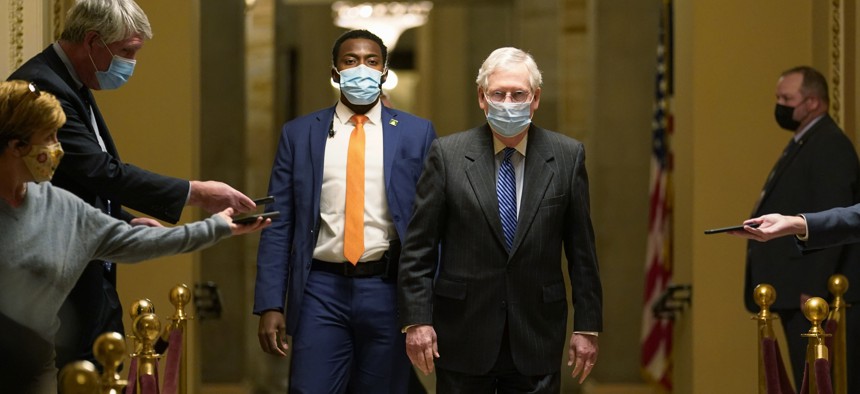Congress Nears Covid-19 Relief Deal With Direct Stimulus Payments, But No Local Government Aid

Senate Majority Leader Mitch McConnell of Ky., walks past reporters on Capitol Hill in Washington, Tuesday, Dec. 15, 2020. AP Photo/Susan Walsh
Representatives from both parties, who met Tuesday and Wednesday, said major headway was made during negotiations on a roughly $900 billion relief package. But more direct help for state and local governments isn't included.
Congressional lawmakers signaled Wednesday that they are closing in on a coronavirus relief deal that may include direct stimulus payments, as well as unemployment benefits and money to help struggling businesses keep employees on staff.
But the proposal is not expected to include direct aid to help state and local governments dealing with revenue shortfalls.
The package in the works would cost roughly $900 billion and be based largely off the framework of a $748 billion proposal put forth earlier this week by a bipartisan group of lawmakers.
One addition, however, would be a repeat of the direct stimulus payments that many Americans received through an earlier aid package. Senate Majority Whip John Thune, a South Dakota Republican, told reporters Wednesday the proposal would likely include $600 direct stimulus checks. The CARES Act approved by Congress in March included $1,200 direct payments to people who made less than $75,000.
The latest aid proposal would also provide $300-a-week unemployment payments through March, Thune said. Those bonus benefits would supplement the aid people receive through state-run programs.
In addition to excluding direct funding for state and local governments, the package is not expected to contain liability shields to restrict people’s ability to sue over coronavirus exposure. Both of those measures have been among the more contentious provisions as lawmakers have negotiated over a possible relief package.
While exact details of the deal are still being hammered out, lawmakers expressed optimism over the fact such in-depth negotiations were happening at all. Speaker Nancy Pelosi, Senate Majority Leader Mitch McConnell, Senate Minority Leader Chuck Schumer and House Minority Leader Kevin McCarthy met for hours Tuesday to discuss an aid package proposal and were expected to meet again Wednesday.
On Wednesday, Schumer told reporters that negotiators were "very close" to a deal.
“We're making really good progress,” he said.
Lawmakers on both sides of the aisle said they were determined to remain in Washington until a deal was reached.
“We made major headway toward hammering out a targeted pandemic relief package that would be able to pass both chambers with bipartisan majorities,” McConnell said during a speech on the Senate floor Wednesday. “We committed to continuing these urgent discussions urgently until we have an agreement.”
Congress will have to act quickly to approve any package it does agree on. Unemployment insurance for workers not covered through traditional programs and other federal programs approved through an earlier congressional relief package will run out at the end of this year without action from Congress. The proposal is also expected to include a short extension of the federal eviction moratorium, which is currently set to expire at the end of this month.
Lawmakers have indicated they intend to attach aid funding provisions to a government funding deal that must be voted on by midnight Friday in order to avoid a government shutdown.
House Democratic Caucus Chairman Rep. Hakeem Jeffries said Wednesday that there has been no discussion of approving another short-term budget extension to provide more time to negotiate the coronavirus provisions.
Jeffries said any deal approved this week by lawmakers now will be a “strong first step” in providing aid that Americans will need to rebound from the pandemic. He emphasized that Democrats expect additional funding to be approved once President-elect Joe Biden takes office in January.
Biden called the latest developments on the stimulus package “encouraging.”
Andrea Noble is a staff correspondent with Route Fifty.
NEXT STORY: Bipartisan Lawmakers Offer Two-Part Covid Relief Package





